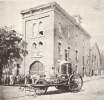AHRENS-FOX FIRE ENGINE COMPANY
The catalogs of the Ahrens-Fox Fire Engine
Company alluded to the fact that their company was directly connected to the
inventor of the steam pumper. This claim was made because in 1868 they had
bought the business from Lane and Bodley who had, in 1862, bought out Alexander
B. Latta (1821-1865). Latta has long been touted as the first inventor of the
steam fire engine, (the Uncle Joe Ross in 1852). This claim has since been disproved.
John Braithwaite in 1828 built an experimental steam fire engine in London. He
along with John Ericsson had, by 1833, built 4 more engines that were used in
France, Russia, and Berlin. Paul R. Hodge produced a steam fire engine in N.Y. in
1840-41. Like most myths this one will no doubt continue.
In March of 1852, a Cincinnati locksmith named Abel Shawk, a
railroad locomotive builder named Alexander Bonner "Moses" Latta, and
a iron-foundry owner named Miles Greenwood, joined forces to build the world's
first successful steam-powered fire engine. Their demonstration was so
successful the city of Cincinnati contracted with them to build a fire engine
for them. Shawk's quick-steaming boiler, which could heat the water to
steam in under 10 minutes, made the steam fire engine practical., while Latta
lent his locomotive expertise to the steam engine, pump, and chassis.
Shawk and Latta, along with Latta's brothers Edmnundson and Finlay
Latta formed the A. B. & E. Latta "Buckeye Works" to build the
engine. Greenwood's factory was used to build the engine called the Uncle
Joe Ross after the city councilman who had championed the building of the
engine.
Miles Greenwood, who was also a city councilman, became the city's
(thus the worlds) first professional paid fire chief running the first paid fire
department.
The Ross was so popular that in 1854 the citizens of Cincinnati
raised the funds to buy a second fire engine aptly named Citizen's Gift.
There was a young apprentice working for Shawk and Latta in their
factory by the name of Chris Ahrens. When Shawk and Latta sold their business in
1863 to Lane & Bodley, a local machine shop, Chris Ahrens became
superintendent of fire engine construction. Five years later Ahrens bought out
the Latta fire engine business, renaming it C. Ahrens & Co.

Foundry
Boiler
Shop
Finishing Shop
In 1877, Ahrens renamed his company the Ahrens Manufacturing
Company. By 1903, Ahrens fire engines held every world record for steam fire
engine performance. When one was broken a new Ahrens engine would set a new
record.
In 1891 Ahrens merged with three of its biggest competitors to form
American Fire Engine Company. Chris Ahrens' son-in-law, Charles Hust Fox, left
his position as assistant Chief of the Cincinnati Fire Department to join the
Ahrens firm. One of Mr. fox's innovations was the Fox Vertical Water Tube
Boiler, which could raise steam from cold water in 3 minutes, and the
"Columbian' steamer, the world's first pumper to carry its own hose. Before
this a steamer required a separate hose wagon to carry its hoses. In 1902 Fox
helped develop the world's first gasoline-powered fire engine.
In 1905 after a protracted legal battle, the Ahrens family
separated the company from the conglomerate that had grown over the years. It
became the Ahrens Fire Engine Company. The company's new type of fire engine was
the "Continental", it was third in sales and again garnered every world
record, delivering the highest gallons per minute, the greatest pressure,
pumping through the longest length of hose lines, and shooting streams further
and higher than any other make of steamer of the day.
Ahrens machine shop in 1905 Located at Alfred & Cook Sts.
In 1910 the company became the Ahrens-Fox Fire Engine Company. They
introduced the first gasoline powered fire engine in 1911.
The company lasted until the last fire engine left the factory in
1953 on Christmas Eve. Spare parts continued to be supplied for the next 37
years.
The 2nd image below is a
model of Latta's first engine. (Cincinnati Fire Museum). The 3rd image shows the
original 3 wheel design of Latta's in this engine called Deluge. It was designed
for engine house #10 at the corner of Third and Lawrence shown in 1868. The
fourth was taken in 1870. The next row down shows what happens when a building
collapses on top of a fire engine. The building to the right is the Cincinnati
Hotel which was located at 821 Sycamore St.



Alexander
Latta
Model of 1st Fire
Engine 1868-3rd and Lawrence Sts.
1870 Fire Engine
POSTCARDS




Factory at 22-26 Webster St
Piston Pumper
*
Old
Joe
Ross
Continental Delivery Test
Pump and Hose Car

Continental delivered to Detroit Michigan.